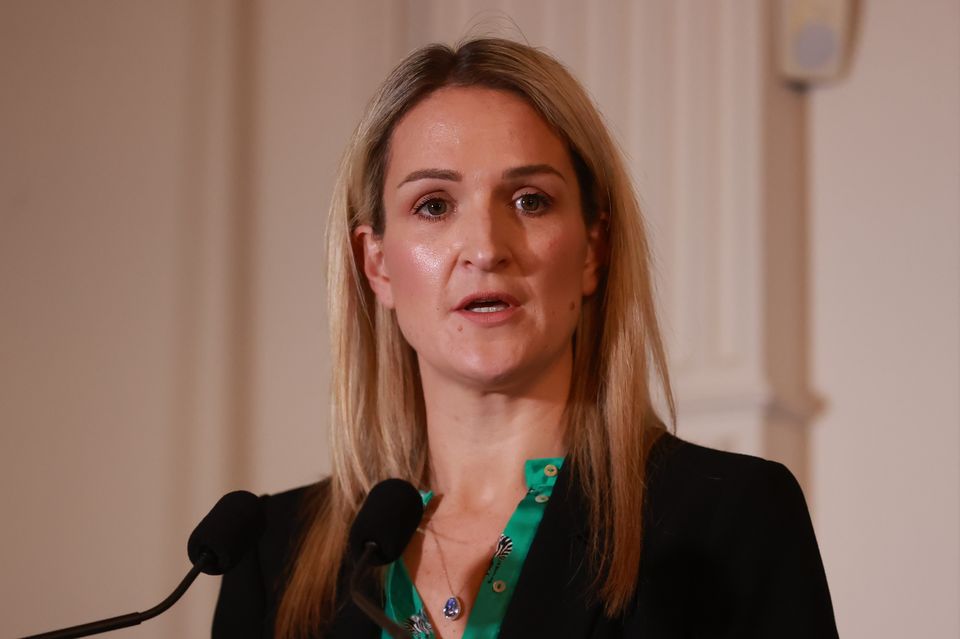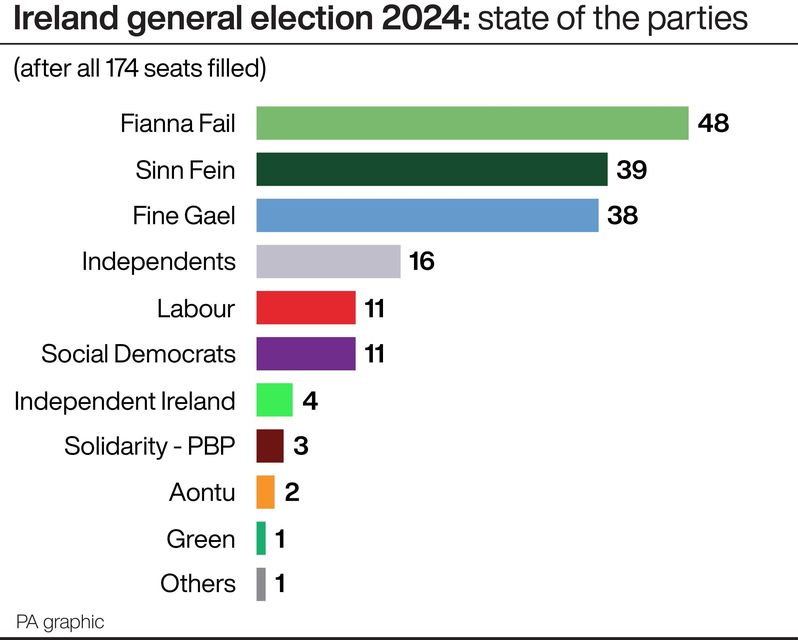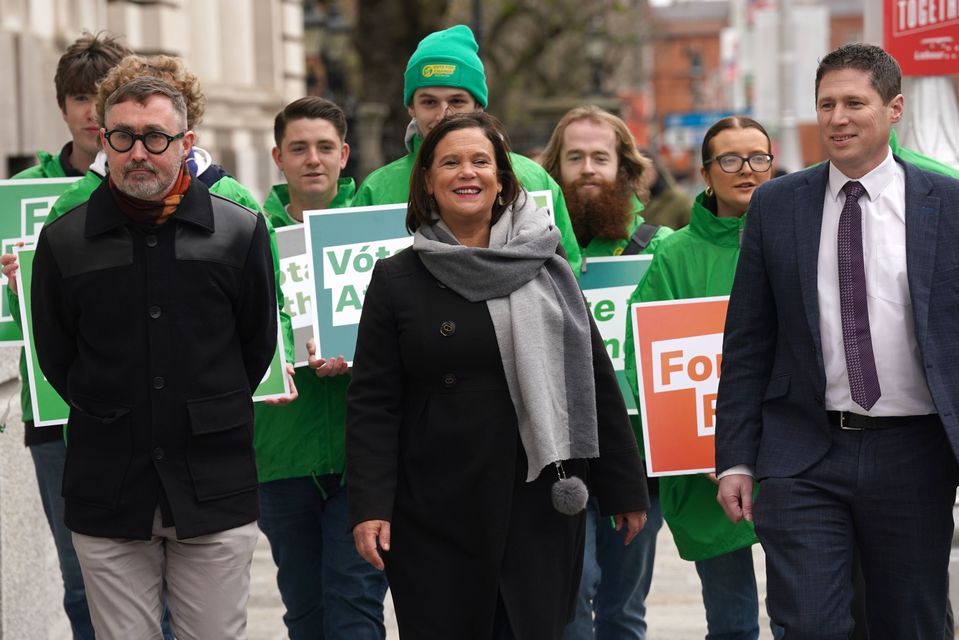Deputy Irish premier Micheal Martin has refused to say whether he will push against a rotating taoiseach as part of government formation talks.
Mr Martin, who was speaking at the British Irish intergovernmental conference in Dublin, said it was too early to discuss what the shape of the next government will look like.
Three long days of counting in the General Election finished late on Monday, when the final two seats were declared in the constituency of Cavan-Monaghan.
Fianna Fail was the clear winner of the election, securing 48 of the Dail parliament’s 174 seats.
Sinn Fein took 39 and Fine Gael 38.
Helen McEntee TD speaking during the British-Irish intergovernmental conference in Dublin (Liam McBurney/PA)
Asked whether he would be open to enter a coalition with Fine Gael without a rotating taoiseach, Fianna Fail leader Mr Martin said: “From experience and having been involved in helping to form a number of coalition governments, it’s not always helpful to do it via press conferences, and I don’t mean that with any disrespect.
“So, I don’t propose to do so on this occasion either.
“There will be a range of issues that will be discussed, policy being key, and obviously then the issues around the formation of government and the mechanics of government.
“But I don’t propose to get into that. It’s far too early, far too premature. We will engage.”
He said he expected to meet other politicians at Leinster House for the switching-on of the Oireachtas Christmas tree lights.
“It might kind of create a nice, happy atmosphere. God knows what could follow from that.”
However, it was short-lived as, unknown to the Tanaiste, the switching-on of the Christmas tree lights was taking place during the press conference on Tuesday evening.
Mr Martin said most of the work could be done by Christmas but “we have to focus on the issues”.
“I don’t think we will have reached agreement by Christmas,” he added.
“But I’m sure that most people in the country want us to form a government as quickly as we can.”
Mr Martin also refused to say which ministerial portfolios his party will want to take, saying he wants to “respect the process”.
(PA Graphics)
He said he wants form a government with parties that can last five years, including those who can “take the rough with the smooth” and have the “backbone to see it through”.
He added: “A lot will depend on how the discussions evolve.
“I do believe there’s enough people in Leinster House who have a common position on core issues in terms of the economic model and Europe, and so forth, that can create a government.
“But we want to hear what others are saying also, because the last time not everybody was as anxious to get into government as they might have proclaimed, and government can be a challenging place to be. So, we just want to test the waters to see what others are saying.”
Fine Gael’s Helen McEntee, who also attended the press conference, said the parliamentary party will meet on Wednesday to discuss their priorities.
“We’re setting ourselves clear goals and targets so we want to make sure that any discussions we have with any party, that we’re focused on for key deliverables,” she said.
“Making sure we have ambitious housing targets, making sure we’re supporting small businesses, making sure that we are focused on disability and services across the country.
“That’s the type of focus and priority, and I believe those are the discussions we will be having tomorrow.
“That’s where it needs to start. Beyond that, it is a matter of engaging then with our Taoiseach and our leader, Simon Harris, engaging with other leaders in other parties, and taking it from there.”
Following the conclusion of the General Election, Labour and the Social Democrats won 11 seats; People Before Profit-Solidarity took three; Aontu secured two; and the Green Party retained only one of its 12 seats. Independents and others accounted for 21 seats.
The return of a Fianna Fail/Fine Gael-led coalition is now highly likely.
However, their combined seat total of 86 leaves them just short of the 88 needed for a majority in the Dail.
A coalition of Fianna Fail and Fine Gael, and a third grouping, possibly made up of Independents, is the likely option.
Earlier, a Sinn Fein TD said they will continue to speak to like-minded parties in a bid to form a left-leaning government and there is a “powerful bloc” of 60 progressive politicians who campaigned for change.
Eoin O Broin said that while Fianna Fail and Fine Gael have the numbers to form a government, the deal has not yet been reached.
Sinn Fein president Mary Lou McDonald contacted the Social Democrats and Labour on Monday to discuss options, and Labour leader Ivana Bacik has also spoken to leaders of other parties.
However, Mr O Broin, the party’s housing spokesman, said it is not a “done deal”.
“The numbers are very clear and Fianna Fail and Fine Gael do have the numbers to form a government, albeit with some external support,” he told RTE Morning Ireland.
“However, a deal hasn’t been reached. A week is a long time in politics and many things can change.
“So, given the fact that our view is that a Fianna Fail/Fine Gael coalition is the worst possible option, despite the fact that Micheal Martin seems intent on bringing Fine Gael in as a junior partner, we said we were going to talk to other like-minded, progressive political parties on the other side of the election.
“That’s exactly what we’re going to do and in the first instance it’s to assess what are the options, what are the possibilities? Micheal Martin clearly has the upper hand. There’s no denying that.”
Sinn Fein leader Mary Lou McDonald, with candidates Eoin O Broin and Matt Carthy, during campaigning (Brian Lawless/PA)
Mr O Broin did not rule out speaking to Fianna Fail if the numbers to form a left-leaning government did not stack up.
“We always said during the election campaign that while our first preference was a government without Fianna Fail or Fine Gael, if those numbers weren’t available, we would talk to everybody, and that includes Fianna Fail,” he added.
“We have always said in the first instance what we would do is talk to like-minded parties. That’s what we’re going to do.
“We obviously also have to meet as a parliamentary party. We have to talk to and listen to our new TDs. We’re kind of taking this step by step and I think that’s the sensible thing for us to do. But let’s also remember, this isn’t just about the numbers.
“If you look at what’s happened on the left side of the political spectrum, Sinn Fein has increased our seats, the Social Democrats and Labour have increased their seats. That’s a powerful bloc of 60 progressive politicians for opposition who campaigned and advocated for change.”
A number of parliamentary parties will meet on Wednesday to discuss their next steps.
Sinn Fein, despite taking 39 seats, lost almost 6% of its vote share.
Mr O Broin said Ms McDonald, who also saw a drop in her vote in Dublin Central, is the “right person” to lead the party.
“Mary Lou McDonald, I think, has had a really, really good campaign again. Go back to where we were, 11% in the locals, a very, very difficult period prior to this election.
“I think during the course of the campaign, people saw Mary Lou at her very best,” the Dublin West TD said.
“I think Mary Lou had a really strong campaign. She is one of the key reasons why we’ve turned the ship around and consolidated the vote.”


